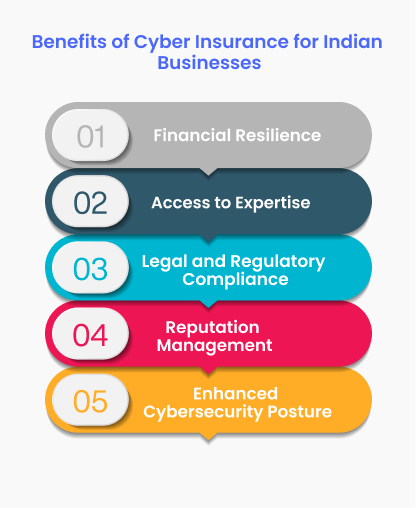“India saw a 300% increase in cyberattacks in 2020.” – National Crime Records Bureau (NCRB). Digital transformation is progressing at a breakneck pace, cyber threats are rising, and businesses are struggling against them. From data breaches to ransomware attacks, the landscape of cyber risks is vast and evolving. Cyber insurance is becoming one of the cornerstones of a comprehensive incident response plan, providing financial indemnity, access to expertise, and support with legal and regulatory issues.

What is Cyber Insurance?
Cyber insurance or cyber liability insurance aims to help firms avoid the financial repercussions of cyber events. It includes costs for data breaches, cyberattacks, and other forms of digital crime, such as legal costs, reputational damage, and business interruption costs.
Quick Read: Cyber Insurance: Why Businesses Need It
The Current Cybersecurity Landscape in India
India’s digital economy is growing, with more than 700 million internet users and a rising digital infrastructure. This growth has made the country a target of cyberwarfare.
According to the National Crime Records Bureau, cybercrime grew by 300% in 2020, with more than 11.5 lakh (1.15 million) registered in the same year.

A report by IBM highlighted that the average cost of a data breach in India reached INR 179 million in 2023, reflecting a 28% increase since 2020.
The report also noted that the most common types of cyberattacks in India were phishing and stolen credentials, which accounted for over 38% of all incidents (IBM India News Room (Legal Bites – Law and Beyond).
The Importance of Incident Response Plans
A planned incident response (IRP) is a formalized methodology for dealing with and managing the aftermath of a cyber incident. The aim is to minimize damage, reduce time and money spent on recovery, and enable businesses to resume regular activity as soon as possible.
Key Components of an Incident Response Plan:
- Preparation: Incident response team formation, policy drafting, and training.
- Detection and Analysis: Detection and assessment of the scale and range of the event.
- Containment, Eradication, and Recovery: The recovery from the disruption in such a way that damage is contained, the underlying cause is resolved, and the damaged systems and data are reconstructed.
- Post-Incident Activity: Conducting post-incident reviews to improve future response efforts.
The Role of Cyber Insurance in Incident Response
- Financial Protection: Cyber insurance provides reimbursement for expenses associated with cyber incidents, such as legal fees, customer notification, and public relations payments). For instance, In 2019, an Indian web store faced a significant data breach.
The company’s cyber insurance policy covered the legal fees and notification costs, enabling it to manage the breach effectively and restore customer confidence (CyberDB).
- Access to Expertise: Cybersecurity expert network access is often included in cyber insurance policies as a component of incident response support.
A ransomware attack victim in the Indian context of a financial house suffered the consequences of such a policy, as it received professional help to recover the encrypted data and return to normal operation, as well as a business interruption rate (Delinea).
- Legal and Regulatory Support: The legal aftermath of a cyber incident can be very daunting. Cyber insurance provides legal assistance to comply with data protection law.
Following a cyber-attack, an Indian healthcare establishment claimed against its cyber-insurance policy to cover legal actions and regulation compliance (Legal Bites – Law and Beyond).
- Public Relations Management: Public perception is critical after a cyber incident. Cyber insurance often indemnifies the cost of public relations activities to prevent reputational damage.
For instance, a big Indian retail store used its cyber insurance policy to address the implications of its data breach and restore customers’ trust through proper public relations handling (CyberDB).
- Enhanced Incident Response Capabilities: Cyber insurance facilitates the development of incident response plans by businesses.
Of course, insurers can demand that policyholders either physically apply certain security practices or conduct periodic risk assessments, which can strengthen a company’s overall cybersecurity posture.

Real-Life Stories of Cyber Insurance in Action
Case Study 1: E-Commerce Data Breach
In 2019, an Indian e-commerce company swept the country due to a data breach that revealed sensitive customer data – names, addresses, and credit card data. The breach led to significant financial and reputational damage. In addition, the company’s cyber insurance policy is paid for as counsel fees, customer notification fees, and public relations fees. This financial assistance allowed the company to end the breach and recover public confidence.
Quick Read: Importance of Cyber Insurance in Data Breach Prevention
Case Study 2: Ransomware Attack on Financial Institution
A financial institution in India suffered a ransomware attack that encrypted vital data and grounded its operations. The institution’s cyber insurance policy allowed it to contact cybersecurity specialists, who helped recover the data by decrypting it. That policy also included, among other things, business interruption costs and alleviated the financial burden on the institution. This is a case study of how important the presence of cyber insurance can be in business continuity in case of a cyber event.
Case Study 3: Healthcare Provider Data Breach
A data breach at an Indian healthcare provider hit patient’s data, including medical notes and personal information. The cyber insurance for the medical insured included the cost of the medical practitioner’s legal charges for achieving the data protection law obligations. Besides, the policy also supported public relations to reduce reputational damage. Here, the significance of cyber insurance for an event is demonstrated when a cyber incident occurs, and the legal and regulatory environment is called into question.
Benefits of Cyber Insurance for Indian Businesses

- Financial Resilience: Cyber insurance is brought to cover businesses against the consequences of cyber incidents. Cyber insurance is such that its provision allows companies to recover their losses without a significant financial setback by absorbing expenses such as legal fees, notification fees, and losses incurred by business disruption.
- Access to Expertise: Cyber insurance policies have access to cybersecurity experts to assist [i.e., advise] during incident response. This knowledge is particularly urgent for cyber incidents’ containment, elimination, and remediation.
- Legal and Regulatory Compliance: Navigating the legal and regulatory landscape after a cyber event can be complex. Cyber insurance policies offer “data protection law and regulation compliance” in legal assistance.
- Reputation Management: Cyber insurance policies usually cover PR actions that may prevent reputational damage. This assistance is critical for rebuilding customer confidence and trust after a cyber event.
- Enhanced Cybersecurity Posture: Cyber insurance fosters a proactive and vigilant security posture through mandatory requirements calling for specific security controls and periodic risk valuations. This results in a more robust security model and a better incident response capability.
Challenges and Considerations
Even with several benefits for businesses, cyber insurance requires some challenges and issues to be discussed.
- Coverage Limitations: However, not all cyber incidents can be covered by a cyber insurance policy. Firms should thoroughly review policy terms and conditions to get an idea of the potential coverage gaps and exclusions that could apply.
- Cost: Cyber insurance premiums are intense, particularly for specialty industries. Companies must weigh the cost of premiums against the potential financial impact of a cyber incident.
- Policy Requirements: [I] Insurers may require the business to introduce certain security controls and to review risk regularly. Failure to meet these requirements can result in claim denial.
- Evolving Threat Landscape: The cyber threat landscape is constantly evolving, and the result may be unprecedented threats for which the current policy has no solution. Businesses must stay informed about emerging threats and ensure their policies remain relevant.
How Mitigata Can Help

Mitigata is at the forefront of providing cyber insurance customized for Indian businesses by addressing cybersecurity challenges. Here’s how Mitigata can assist:
- Comprehensive Coverage: Mitigata offers comprehensive cyber insurance policies that cover a wide range of cyber incidents, including data breaches, ransomware attacks, and business interruption losses.
- Access to Cybersecurity Experts: Mitigata policies give access to a team of cybersecurity professionals who act as advisors and assistance tools during incident response. These agencies also assist businesses in effective prevention, eradication, and restoration from cyber incidents.
- Legal and Regulatory Support: Mitigata’s cyber insurance protection includes counsel and assistance to obtain compliance with data protection laws and regulations. This tool is handy for comprehending the legal structure of a cyber incident.
- Public Relations Management: Mitigata’s policy compensates resources for PR work that will be used to manage reputational damage. This support is applied to rebuild customer trust and confidence after a cyber attack.
- Proactive Cybersecurity Measures: Mitigata encourages companies to adopt an active security role, which requires the deployment of specific security solutions and recursive risk reviews. As a result, there is a stronger security backbone and improved incident response capability.
Conclusion
Cyber insurance is a necessary component of an effective incident response plan. It provides access to financing, expertise, legal and regulatory services, public relations services, and management services. For Indian enterprises, cyber insurance offers resilience against increasing cyber threats.
Mitigata offers comprehensive cyber insurance solutions tailored to the needs of Indian businesses. With Mitigata, companies can navigate the complexities of cybersecurity and ensure business continuity during cyber incidents.
Take the first step towards a secure digital future. Contact Mitigata today to learn more about our cyber insurance offerings and how we may help safeguard your business from cyber attacks.


Awesome. Very insightful.
Cyber insurance is explained in this blog in a clear and understandable manner. It’s a valuable read for businesses looking to improve their cybersecurity strategy and reduce cybersecurity risks.